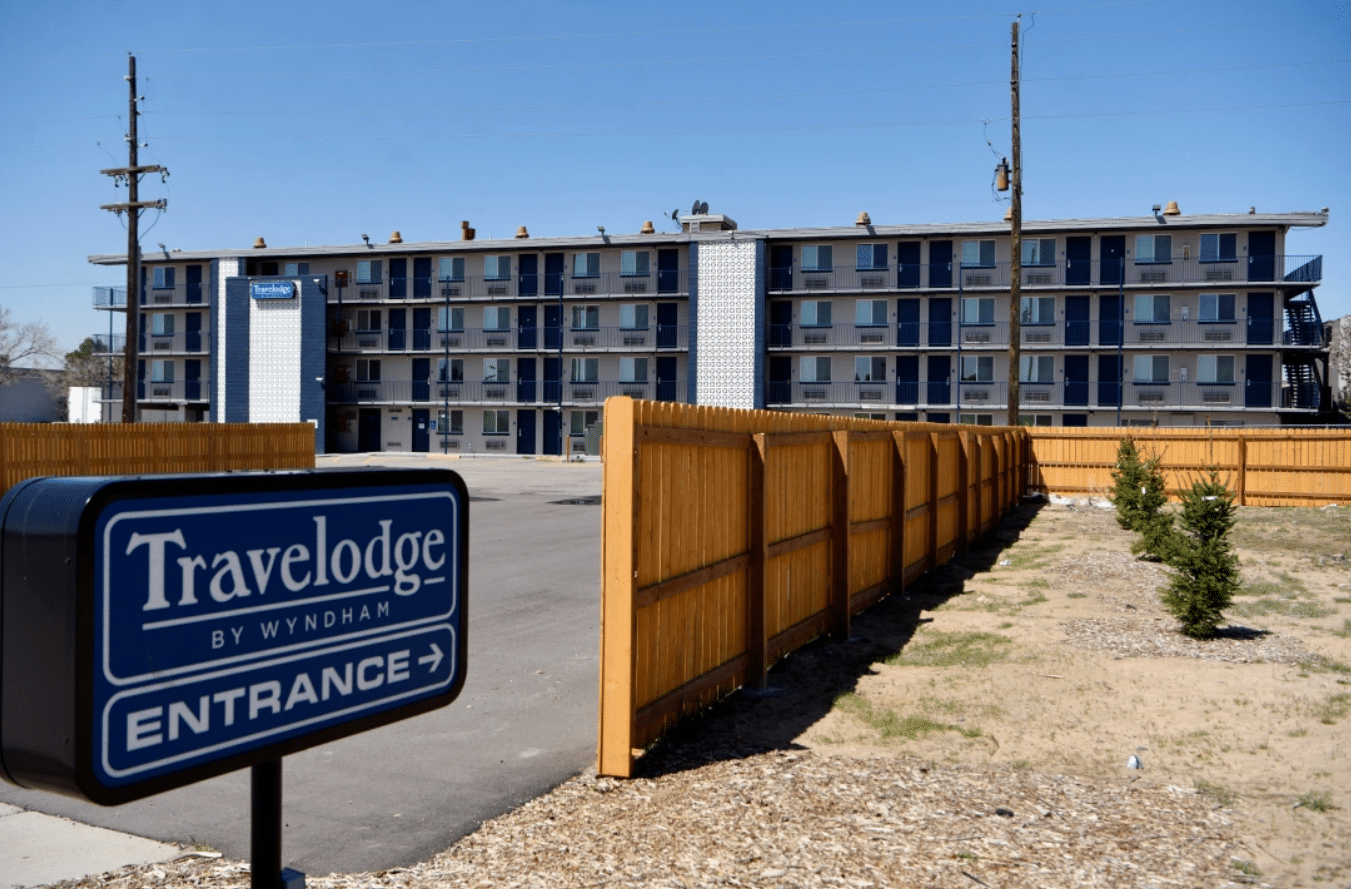
The seller of the former Stay Inn at 12033 E. 38th Ave. in Denver bought it with plans to reopen it as a Travelodge. (Eric Lutzens/The Denver Post)
A city plan to buy a northeast Denver motel to use as housing finally came to fruition on Friday.
The former Stay Inn at 12033 E. 38th Ave. changed hands in the morning when paperwork was signed on a deal originally announced in May 2021.
On the 6th day of that month, Congresswoman Diana Degette and then-Mayor Michael Hancock held a press conference to announce the city would be buying the property, in part with federal funds. It would be used as a homeless shelter, they said, before being converted to supportive housing. A city official said people might be able to move in by the end of 2021.
Then, the property sat.
It wasn’t until late 2022 that a purchase contract made its way to the Denver City Council, which unanimously approved it this past January. At the time, city staff said the deal would close in the first quarter of 2023. It ultimately closed in the third, with Hancock no longer in office.
The city paid $9 million for the 96-room building as well as adjacent undeveloped parcels. That was $1.2 million more than originally announced, which the seller previously attributed in part to the delays.
The delays come at a time when the city and various other housing and homeless support organizations increasingly see motels as a homelessness solution. Other deals have been completed or are in the works, including one announced in late July involving the Denver Housing Authority. Mayor Mike Johnston, who took office last month, has said he wants to house 1,000 homeless people by the end of the year.
Derek Woodbury, spokesman for the city’s Department of Housing Stability, attributed part of the delay on the purchase of the Stay Inn to the federal funding. Two million dollars in HUD money was put toward the purchase, and “the grant agreement for this funding was not fully executed until late 2022.”
The delay since the expected closing in the first quarter of this year, Woodbury said, was largely due to an environmental review process which is required for deals made with HUD money. It took longer than expected.
“There was no major issue to be addressed,” Woodbury said. “There were just idiosyncrasies in the HUD process that required rework.”
The property was sold by Englewood-based Situs Group, which bought the property for $4.3 million in November 2019, intending to renovate and reopen it as a Travelodge by Wyndham. The pandemic and damage from a windstorm kept that from happening, and then the city reached out.

Hugo Weinberger
Situs President Hugo Weinberger noted that he’s made a number of upgrades to the building, including adding kitchenettes and a sprinkler system to bring the structure in line with current fire code. Getting a certificate of occupancy — which the city issues — was challenging, particularly the process involving Denver Fire, he said.
“Working with the city, we knew it was going to take some time, and that they had a different process than a typical buyer,” Weinberger said.
“It’s a long and challenging process, and I don’t think it’s necessarily at the fault of the city,” he said. “Dealing with federal funding and HUD is challenging, and they have a process.”
The city no longer plans to operate the building as a shelter for a time, instead skipping right to supportive housing, Woodbury said. But don’t expect to see people moving in tomorrow. That’s because the property needs to be rezoned to allow for housing.
Real estate being sold in Denver is regularly rezoned prior to closing. The intended buyers request the rezoning with the permission of the property owner, and closing is often contingent upon it being approved.
Asked why Denver didn’t rezone the property already, Woodbury said: “Rezoning applications require property owner permission. We did not have that in this case.”
Weinberger, meanwhile, told BusinessDen “we never discussed that” and that he was unaware the property needed to be rezoned.
“I would have done whatever they needed to get from here to there,” he said.
Weinberger said he looks forward to the former motel being “an asset in the hands of the city” and housing those in need. He said he’s involved in ongoing talks regarding how similar deals can come together in the future, ideally faster.
“Figuring out how to streamline these sales and ultimately get people into beds faster needs to be prioritized,” he said. “People could have been living here a couple years ago.”

The seller of the former Stay Inn at 12033 E. 38th Ave. in Denver bought it with plans to reopen it as a Travelodge. (Eric Lutzens/The Denver Post)
A city plan to buy a northeast Denver motel to use as housing finally came to fruition on Friday.
The former Stay Inn at 12033 E. 38th Ave. changed hands in the morning when paperwork was signed on a deal originally announced in May 2021.
On the 6th day of that month, Congresswoman Diana Degette and then-Mayor Michael Hancock held a press conference to announce the city would be buying the property, in part with federal funds. It would be used as a homeless shelter, they said, before being converted to supportive housing. A city official said people might be able to move in by the end of 2021.
Then, the property sat.
It wasn’t until late 2022 that a purchase contract made its way to the Denver City Council, which unanimously approved it this past January. At the time, city staff said the deal would close in the first quarter of 2023. It ultimately closed in the third, with Hancock no longer in office.
The city paid $9 million for the 96-room building as well as adjacent undeveloped parcels. That was $1.2 million more than originally announced, which the seller previously attributed in part to the delays.
The delays come at a time when the city and various other housing and homeless support organizations increasingly see motels as a homelessness solution. Other deals have been completed or are in the works, including one announced in late July involving the Denver Housing Authority. Mayor Mike Johnston, who took office last month, has said he wants to house 1,000 homeless people by the end of the year.
Derek Woodbury, spokesman for the city’s Department of Housing Stability, attributed part of the delay on the purchase of the Stay Inn to the federal funding. Two million dollars in HUD money was put toward the purchase, and “the grant agreement for this funding was not fully executed until late 2022.”
The delay since the expected closing in the first quarter of this year, Woodbury said, was largely due to an environmental review process which is required for deals made with HUD money. It took longer than expected.
“There was no major issue to be addressed,” Woodbury said. “There were just idiosyncrasies in the HUD process that required rework.”
The property was sold by Englewood-based Situs Group, which bought the property for $4.3 million in November 2019, intending to renovate and reopen it as a Travelodge by Wyndham. The pandemic and damage from a windstorm kept that from happening, and then the city reached out.

Hugo Weinberger
Situs President Hugo Weinberger noted that he’s made a number of upgrades to the building, including adding kitchenettes and a sprinkler system to bring the structure in line with current fire code. Getting a certificate of occupancy — which the city issues — was challenging, particularly the process involving Denver Fire, he said.
“Working with the city, we knew it was going to take some time, and that they had a different process than a typical buyer,” Weinberger said.
“It’s a long and challenging process, and I don’t think it’s necessarily at the fault of the city,” he said. “Dealing with federal funding and HUD is challenging, and they have a process.”
The city no longer plans to operate the building as a shelter for a time, instead skipping right to supportive housing, Woodbury said. But don’t expect to see people moving in tomorrow. That’s because the property needs to be rezoned to allow for housing.
Real estate being sold in Denver is regularly rezoned prior to closing. The intended buyers request the rezoning with the permission of the property owner, and closing is often contingent upon it being approved.
Asked why Denver didn’t rezone the property already, Woodbury said: “Rezoning applications require property owner permission. We did not have that in this case.”
Weinberger, meanwhile, told BusinessDen “we never discussed that” and that he was unaware the property needed to be rezoned.
“I would have done whatever they needed to get from here to there,” he said.
Weinberger said he looks forward to the former motel being “an asset in the hands of the city” and housing those in need. He said he’s involved in ongoing talks regarding how similar deals can come together in the future, ideally faster.
“Figuring out how to streamline these sales and ultimately get people into beds faster needs to be prioritized,” he said. “People could have been living here a couple years ago.”
